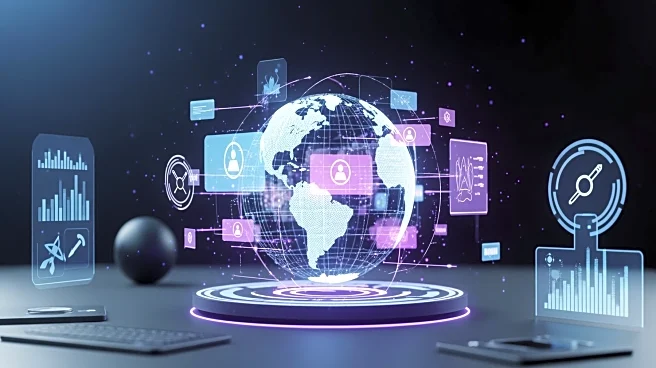What's Happening?
As the year 2026 approaches, artificial intelligence (AI) is set to transform content creation significantly. Marketers are increasingly adopting AI tools that integrate writing, visuals, and analytics into cohesive systems, enhancing the efficiency and personalization
of content. These tools, such as Canva AI and Higgsfield, allow creators to generate text, imagery, audio, and video from a single brief, streamlining workflows and maintaining consistent messaging across formats. The rise of personalization is driven by AI's ability to use behavioral analytics and engagement data to tailor messages for individual audiences, improving conversion rates. Ethical considerations are also being addressed, with future content systems embedding safeguards like source citations and bias detection to ensure transparency and authenticity.
Why It's Important?
The integration of AI tools in content creation is poised to have a profound impact on marketing strategies and business operations. By automating routine tasks, AI allows marketers to focus on strategy and storytelling, potentially increasing the effectiveness of campaigns. The ability to personalize content based on data analytics can lead to higher engagement and conversion rates, benefiting businesses financially. Moreover, the emphasis on ethical AI practices is crucial in building consumer trust and complying with regulatory standards. As AI tools become more sophisticated, they offer the potential to revolutionize how content is created and consumed, making it more relevant and impactful.
What's Next?
Looking ahead, the continued development of AI tools will likely lead to even more advanced personalization and automation capabilities. Marketers may increasingly rely on AI as a collaborative partner, rather than just a tool, to execute complex campaigns. The focus on ethical AI practices will grow, with companies prioritizing transparency and privacy in their AI systems. As AI technology evolves, businesses will need to adapt their strategies to leverage these tools effectively, ensuring they remain competitive in a rapidly changing digital landscape.
Beyond the Headlines
The shift towards AI-driven content creation raises important ethical and cultural considerations. While AI can enhance efficiency, it cannot fully replicate human creativity and cultural understanding. This underscores the importance of human oversight in ensuring content resonates emotionally and culturally with diverse audiences. Additionally, the reliance on AI tools may lead to a homogenization of content, where unique voices and perspectives are overshadowed by algorithm-driven outputs. As AI continues to shape the future of content creation, balancing technological innovation with human creativity will be key to maintaining authenticity and diversity in media.















